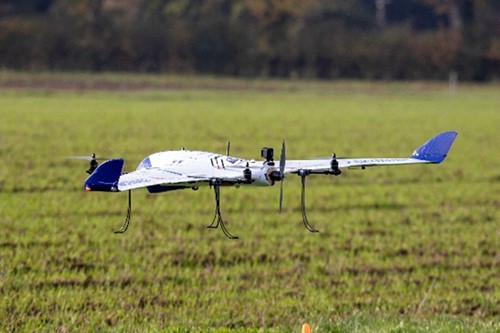Skyfarer, a drone logistics operator, is leading a consortium create a new drone network infrastructure to provide quicker and greener forms of medical transport across England.
The project has received operational authorisation for extended visual line of sight operations (EVLOS) with an overweight unmanned aircraft system (UAS) from the Civil Aviation Authority, which gives the consortium the green light to conduct short-range flight demonstrations as part of the project. These will test the capabilities of drones for logistics, with technology trials taking place after Easter and delivery trials taking place in the summer.
The project is funded by Innovate UK, part of UK Research and Innovation (UKRI), and aims to pave the way for harnessing the power of unmanned aerial vehicles (UAVs) to revolutionise the provision of healthcare services.
Cranfield University is helping stage technology trials for the project beginning in May 2021, when flights will be taking place at the University’s airport. The trials also rely on Altitude Angel’s Unified Traffic Management technology to ensure that drones are able to share airspace with manned aviation safely and securely. Phoenix Wings, a German drone manufacturer, is supporting the project by providing a drone with a payload capacity that can meet 97% of vital blood delivery requirements in England. Telecoms giant O2 is also a consortium member. The consortium plans to create a national infrastructure enabling same day delivery with autonomous drones in the future.
O2 is working in collaboration with regulator Ofcom to support the six-month project by providing SIM cards that will allow 4G and 5G mobile devices to be used in the utilisation of drones for medical deliveries. This will allow for a safe and reliable real-time control mechanism, making it possible for drones to fly safely over long ranges carrying vital medical supplies.
At the next stage of the project, the consortium will conduct a feasibility study and scoping exercise, which will inform the creation of a drone corridor where UAVs will be able to deliver essential supplies without the need for a human driver. The consortium aims to have fully operational routine medical deliveries taking place by 2022.
There are 2.5 million units of blood processed and distributed in the UK every year – and more than 200,000 new blood donors are required to give blood every year across England to replace those who can no longer donate regularly. The consortium’s drone delivery system promises faster turnaround times on autonomous deliveries, which can be processed at any time and therefore provide a more reliable delivery service to meet supply and processing needs for hospitals and medical hubs around the country.
The delivery system will also aim to reduce waiting times for vital medicines and other medical supplies, with the ability to supply medicine to all-terrain and off-track locations. The consortium also hopes that the adoption of drone deliveries will upskill local workers and innovate the budding medical drone delivery sector.
For more information visit:




